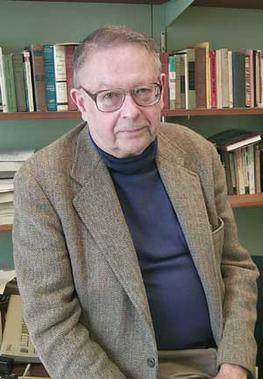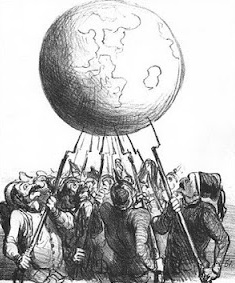Neorealism or structural realism is a theory of international relations that emphasizes the role of power politics in international relations, sees competition and conflict as enduring features and sees limited potential for cooperation. The anarchic state of the international system means that states cannot be certain of other states' intentions and their security, thus prompting them to engage in power politics.
International relations theory is the study of international relations (IR) from a theoretical perspective. It seeks to explain behaviors and outcomes in international politics. The four most prominent schools of thought are realism, liberalism, constructivism, and rational choice. Whereas realism and liberalism make broad and specific predictions about international relations, constructivism and rational choice are methodological approaches that focus on certain types of social explanation for phenomena.
The concept of balancing derives from the balance of power theory, the most influential theory from the realist school of thought, which assumes that a formation of hegemony in a multistate system is unattainable since hegemony is perceived as a threat by other states, causing them to engage in balancing against a potential hegemon.

Kenneth Neal Waltz was an American political scientist who was a member of the faculty at both the University of California, Berkeley and Columbia University and one of the most prominent scholars in the field of international relations. He was a veteran of both World War II and the Korean War.
In international relations, the security dilemma is when the increase in one state's security leads other states to fear for their own security. Consequently, security-increasing measures can lead to tensions, escalation or conflict with one or more other parties, producing an outcome which no party truly desires; a political instance of the prisoner's dilemma.
Regime theory is a theory within international relations derived from the liberal tradition that argues that international institutions or regimes affect the behavior of states or other international actors. It assumes that cooperation is possible in the anarchic system of states, as regimes are, by definition, instances of international cooperation.

International security is a term which refers to the measures taken by states and international organizations, such as the United Nations, European Union, and others, to ensure mutual survival and safety. These measures include military action and diplomatic agreements such as treaties and conventions. International and national security are invariably linked. International security is national security or state security in the global arena.

In international relations theory, realism is one of the dominant schools of thought, theoretically formalizing the statesmanship of Realpolitik of early modern Europe. Although a highly diverse body of thought, realism is unified by the belief that world politics is always and necessarily a field of conflict among actors pursuing wealth and power. The theories of realism contrast with the cooperative ideals of liberalism in international relations.
Polarity in international relations is any of the various ways in which power is distributed within the international system. It describes the nature of the international system at any given period of time. One generally distinguishes three types of systems: unipolarity, bipolarity, and multipolarity for three or more centers of power. The type of system is completely dependent on the distribution of power and influence of states in a region or globally.
In international relations (IR), constructivism is a social theory that asserts that significant aspects of international relations are shaped by ideational factors. The most important ideational factors are those that are collectively held; these collectively held beliefs construct the interests and identities of actors.
Offensive realism is a structural theory in international relations that belongs to the neorealist school of thought and was put forward by the political scholar John Mearsheimer in response to defensive realism. Offensive realism holds that the anarchic nature of the international system is responsible for the promotion of aggressive state behavior in international politics. The theory fundamentally differs from defensive realism by depicting great powers as power-maximizing revisionists privileging buck-passing and self-promotion over balancing strategies in their consistent aim to dominate the international system. The theory brings important alternative contributions for the study and understanding of international relations but remains the subject of criticism.
In international relations theory, the concept of anarchy is the idea that the world lacks any supreme authority or sovereignty. In an anarchic state, there is no hierarchically superior, coercive power that can resolve disputes, enforce law, or order the system of international politics. In international relations, anarchy is widely accepted as the starting point for international relations theory.

The balance of power theory in international relations suggests that states may secure their survival by preventing any one state from gaining enough military power to dominate all others. If one state becomes much stronger, the theory predicts it will take advantage of its weaker neighbors, thereby driving them to unite in a defensive coalition. Some realists maintain that a balance-of-power system is more stable than one with a dominant state, as aggression is unprofitable when there is equilibrium of power between rival coalitions.

Theory of International Politics is a 1979 book on international relations theory by Kenneth Waltz that creates a structural realist theory, neorealism, to explain international relations. Taking into account the influence of neoclassical economic theory, Waltz argued that the fundamental "ordering principle" (p. 88) of the international political system is anarchy, which is defined by the presence of "functionally undifferentiated" (p. 97) individual state actors lacking "relations of super- and subordination" (p. 88) that are distinguished only by their varying capabilities.
Randall L. Schweller is Professor of Political Science at the Ohio State University, where he has taught since 1994.

The Tragedy of Great Power Politics is a book by the American scholar John Mearsheimer on the subject of international relations theory published by W.W. Norton & Company in 2001. Mearsheimer explains and argues for his theory of "offensive realism" by stating its key assumptions, evolution from early realist theory, and its predictive capability. An article adapted from the book had previously been published by Foreign Affairs.
Liberal institutionalism is a theory of international relations that holds that international cooperation between states is feasible and sustainable, and that such cooperation can reduce conflict and competition. Neoliberalism is a revised version of liberalism. Alongside neorealism, liberal institutionalism is one of the two most influential contemporary approaches to international relations.

Classical realism is an international relations theory from the realist school of thought. Realism makes the following assumptions: states are the main actors in the international relations system, there is no supranational international authority, states act in their own self-interest, and states want power for self-preservation. Classical realism differs from other forms of realism in that it places specific emphasis on human nature and domestic politics as the key factor in explaining state behavior and the causes of inter-state conflict. Classical realist theory adopts a pessimistic view of human nature and argues that humans are not inherently benevolent but instead they are self-interested and act out of fear or aggression. Furthermore, it emphasizes that this human nature is reflected by states in international politics due to international anarchy.
The balance of threat theory was proposed by Stephen M. Walt in his article Alliance Formation and the Balance of World Power, published in the journal International Security in 1985. It was later further elaborated in his book The Origins of Alliances (1987). The theory modified the popular balance of power theory in the neorealist school of international relations.
Charles Louis Glaser is a scholar of international relations theory, known for his work on defensive realism, as well as nuclear strategy. He is the founding director of the Institute for Security and Conflict Studies at the George Washington University's Elliott School of International Affairs, as well as a professor of political science and international affairs. His best-known book, Rational Theory of International Politics: The Logic of Competition and Cooperation received an Honorable Mention for 2011 Best Book from the International Security Studies Section of the International Studies Association.






